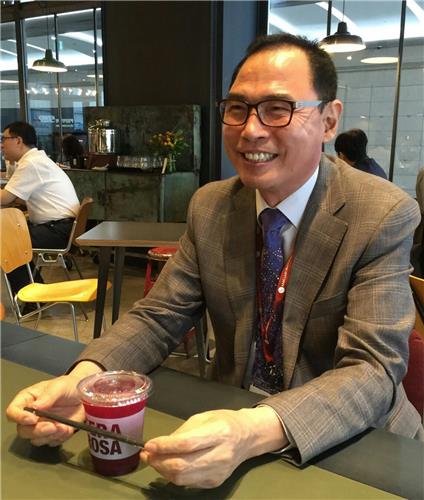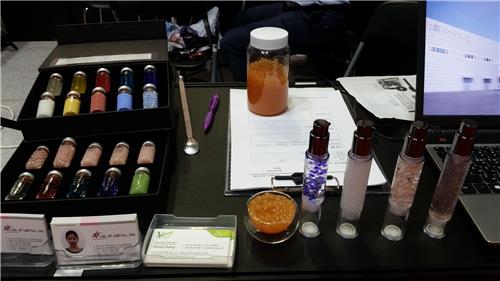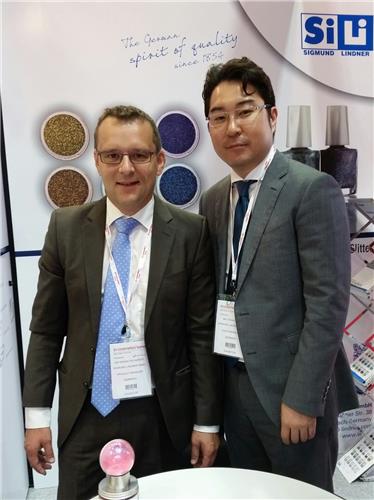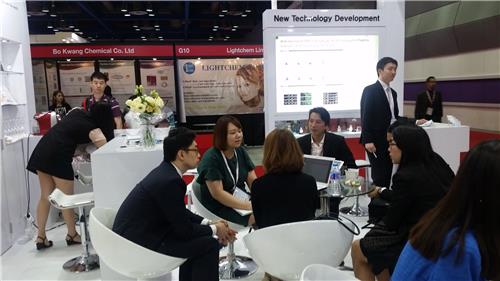SEOUL, July 7 (Yonhap) -- Display booths bustling with multinational businesspeople from the beauty industry at an exhibition hall in Seoul on Thursday clearly indicated South Korea has now emerged as a significant market for global cosmetics ingredient companies.
In the second exhibition, dubbed "in-cosmetics Korea," officials from some 200 multinational cosmetics ingredient providers were in talks with cosmetics manufacturers from around the world in their booths for possible deals. Groups of people even lined up in front of some booths to look around or to talk.
"It is rare to see an exhibition whose booths are packed with negotiating people like this. It reflects the cosmetics markets have a bigger growth potential globally," Youn Joo-taek, chairman of the International Beauty Industry Trade Association (IBITA), told Yonhap News Agency in an interview. The two-day exhibition ended Thursday at COEX in Samsung-dong, southern Seoul.
Korea has been the venue for this exhibition since last year, as the country's leading cosmetics maker AmorePacific Corp. strengthened its presence with the stellar performance of its ginseng-based "Sulwhasoo" skin care lineup, particularly among Chinese people, helped by the phenomenon of the rising popularity of Korean pop culture, or hallyu, he said.
About 4,000 people, up 28 percent from last year, visited the country's only cosmetics ingredient exhibition this year to attend multiple seminars to share and learn about the latest cosmetics ingredients and most innovative formulations, said Youn. He heads the IBITA, which helps Reed Exhibitions operate the annual event.
 In this photo taken on July 7, 2016, Youn Joo-taek, chairman of the International Beauty Industry Trade Association (IBITA), smiles during an interview with Yonhap News Agency at a coffee shop near COEX hall where the country's sole cosmetics ingredient exhibition is held from July 6-7. (Yonhap)
In this photo taken on July 7, 2016, Youn Joo-taek, chairman of the International Beauty Industry Trade Association (IBITA), smiles during an interview with Yonhap News Agency at a coffee shop near COEX hall where the country's sole cosmetics ingredient exhibition is held from July 6-7. (Yonhap)
Reed Exhibitions, a London-based exhibition planner and operator company, selected Korea to kick-start the annual exhibition in Seoul last year "due to the country's big growth potential in the cosmetics business," he said.
The British company, which handles about 500 exhibitions in 30 countries each year, said the Seoul exhibition will be the platform where cosmetics industry people can gain access to innovative cosmetics materials produced across the world in one place.
A decade ago, Korea imported most of the ingredients it demanded to develop and manufacture cosmetics products from coconut and palm-rich countries. Core cosmetics ingredients are extracted from coconut and palm oil, Youn said.
"But it now imports about 80 percent of overall ingredients and strives to develop new ingredients based on imported raw materials and domestic materials to reduce its dependence on imported materials," he said, adding that manufacturing will remain the mainstay business for Korean cosmetics companies, though.
 This photo taken on July 7, 2016, shows cosmetics ingredients displayed in a booth set up by a Chinese company during the "in-cosmetics Korea exhibition" held at COEX hall in southern Seoul from July 6-7. (Yonhap)
This photo taken on July 7, 2016, shows cosmetics ingredients displayed in a booth set up by a Chinese company during the "in-cosmetics Korea exhibition" held at COEX hall in southern Seoul from July 6-7. (Yonhap)
Korea's beauty and personal care market is expected to reach $12 billion in terms of retail sales this year, according to Euromonitor International.
IBITA said Korea's 10 trillion won ($8.6 billion) cosmetics market will grow further on the back of the growing popularity of its "competitively-priced but quality" products in China, Europe, the United States and the Middle East.
Domestically, men in their 40s or older are emerging as a major purchasing force of the skin care and anti-aging lineup to survive tougher competition in their workplaces or look attractive in their communities, giving a boost to the beauty industry.
Officials from participating ingredient companies expect Korean cosmetics companies to be able to gain a share over time in global markets with an improved awareness and quality products. They currently focus on the domestic market.
"To strengthen their position overseas, Korean cosmetics companies should continue to develop high-end products and conduct aggressive marketing to improve its brand awareness overseas. Their brand awareness lags far behind global majors such as L'Oreal and Estee Lauder," Erwin Pschierer, head of product management at Sigmund Lindner GmbH, told Yonhap News Agency.
The German company will "probably" participate in the same exhibition next year after it had more than "50 contacts" with potential buyers this time in Seoul, including Korean firms, he said.
 This photo taken on July 7, 2016, Erwin Pschierer, head of product management at Sigmund Lindner GmbH, poses for a photo with his Korean colleague in the company's booth during the 'in-cosmetics Korea' exhibition held in Seoul on July 6-7. (Yonhap)
This photo taken on July 7, 2016, Erwin Pschierer, head of product management at Sigmund Lindner GmbH, poses for a photo with his Korean colleague in the company's booth during the 'in-cosmetics Korea' exhibition held in Seoul on July 6-7. (Yonhap)
In fact, Korean companies have long been major buyers of cosmetics ingredients. But Caregen Co., a tech-heavy KOSDAQ-listed company, has bucked the trend to expand the exports of its cosmetics ingredients and other raw materials needed to manufacture beauty products.
"We also see a growing volume of shipments of the beauty products that have anti-aging, anti-pigmentation, hair growth and anti-obesity functions to scores of overseas markets. We put a bigger focus on selling raw materials in a value-added business," Danny Kim, deputy general manager at Caregen, said.
Sam Wu, chief of the Jiangsu-based Yixing Xinyu Chemicals Co., said the hair dye materials company is increasing partnerships with Korean companies. As they spend more on research and development to produce hybrid ingredients and innovative products, it will work, he said.
"AmorePacific has developed cosmetics products based on raw materials extracted from green leaves harvested on Jeju Island. It is a hit product in global markets. Given this, developing new cosmetics ingredients will be a new growth driver for local companies as well as the country struggling with slowing growth," Youn said.
 In this photo taken on July 7, 2016, a group of businesspeople are in talks for possible deals at Caregen's booth during the "in-cosmetics Korea" exhibition held at COEX hall in Seoul on July 6-7. (Yonhap)
In this photo taken on July 7, 2016, a group of businesspeople are in talks for possible deals at Caregen's booth during the "in-cosmetics Korea" exhibition held at COEX hall in Seoul on July 6-7. (Yonhap)